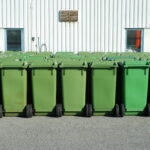The Massachusetts Department of Environmental Protection (MassDEP) has published the final 2030 Solid Waste Master Plan and announced the following amendments to the waste ban regulations, which will be effective on November 1, 2022: Mattresses will be banned from disposal. Textiles will be banned from disposal. The Commercial Organics Disposal Ban will apply to businesses…
Since 2014, when the Massachusetts Department of Environmental Protection (MassDEP) enacted the Commercial Food Material Disposal Ban, businesses and institutions across the state have increasingly started diverting food waste. While food waste diversion leads to significant environmental benefits, it also has potential to provide cost savings for businesses, and opens up opportunities to address customer…
The supermarket industry in Massachusetts has long been a leader in diverting wasted food from disposal. Recent media coverage highlights successful food recovery efforts conducted by three grocery chains with locations in Massachusetts: Hannaford Supermarkets, Stop & Shop and Whole Foods Market. These grocery retailers, as well as many others, employ strategies across the EPA…
Widespread changes in consumer dining and purchasing practices during the COVID-19 pandemic shifted food waste generation from business sectors like catering, restaurants, and institutional cafeterias to homes, impacting composting operations across the state. As described by The Vineyard Gazette, the Martha’s Vineyard Food Waste Recovery Initiative is one of many programs that experienced a reduction…
During the COVID-19 pandemic, Mount Holyoke College effectively adjusted their operations and used data tracking tools to prevent food waste. Between August 2020 and January 2021, the institution cut the food waste generated on campus by 49% by weight. As described by Leanpath, the private liberal arts college in western Massachusetts adapted to a number…
According to the Massachusetts Department of Environmental Protection, there are more than 400 supermarkets in Massachusetts that are likely subject to the Commercial Organics Waste Ban. There are plenty of cost-effective ways that supermarkets and other food businesses can comply with the ban by reducing or diverting food waste. In a recently published article, Waste…
Restaurateurs and business owners are faced with numerous demands on a regular basis – from pleasing customers, to operational logistics, to balancing books, to adapting to changes brought about by the COVID-19 pandemic. MetroWest Daily News recently highlighted another factor businesses must consider: establishing and maintaining successful recycling and composting programs. Cardboard, bottles and cans,…
With reduced demand in the service industry, some fresh food suppliers are experiencing high inventory levels. This is resulting in the delivery of products that have been in storage for longer than normal. As described by Leanpath, the delivery of products with a reduced shelf life can impact quality and pose challenges to businesses that…
Tatte Bakery & Café has partnered with the nonprofit food rescue organization Rescuing Leftover Cuisine to redirect edible surplus food for donation, according to WickedLocal. The employee-led program launched in June 2020, and currently takes place at ten of the chain’s eighteen locations. With pick-ups on Mondays and Thursdays, the business has recovered about 180…
Massachusetts businesses and institutions now have an additional outlet to handle their packaged and unpackaged wasted food. As recently reported by Biocycle, a new depackaging and processing Organics Recycling Facility (ORF) in Agawam is now fully operational. Owned and operated by Vanguard Renewables, the 13,000 square foot fully-enclosed facility is the newest addition to a…

